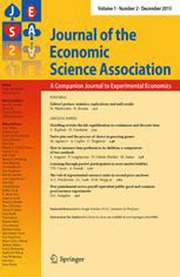Article contents
The statistical power of individual-level risk preference estimation
Published online by Cambridge University Press: 17 January 2025
Abstract
Accurately estimating risk preferences is of critical importance when evaluating data from many economic experiments or strategic interactions. I use a simulation model to conduct power analyses over two lottery batteries designed to classify individual subjects as being best explained by one of a number of alternative specifications of risk preference models. I propose a case in which there are only two possible alternatives for classification and find that the statistical methods used to classify subjects result in type I and type II errors at rates far beyond traditionally acceptable levels. These results suggest that subjects in experiments must make significantly more choices, or that traditional lottery pair batteries need to be substantially redesigned to make accurate inferences about the risk preference models that characterize a subject’s choices.
Keywords
Information
- Type
- Original Paper
- Information
- Journal of the Economic Science Association , Volume 6 , Issue 2: Special Issue: Statistical Issues for Experimental Economists , December 2020 , pp. 168 - 188
- Copyright
- Copyright © Economic Science Association 2020
Footnotes
Electronic supplementary material The online version of this article (https://doi.org/10.1007/s40881-020-00098-x) contains supplementary material, which is available to authorized users.
Special thanks to Glenn Harrison, Don Ross, and Andre Hofmeyr for providing comments and feedback on this paper.
References
- 3
- Cited by

